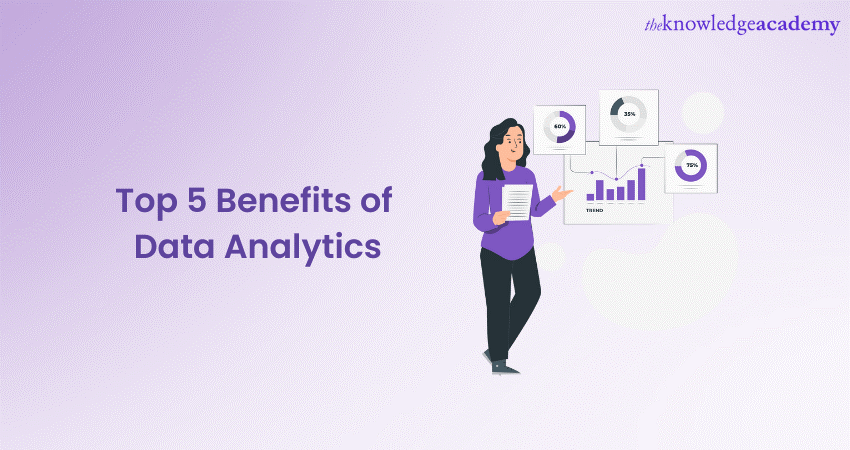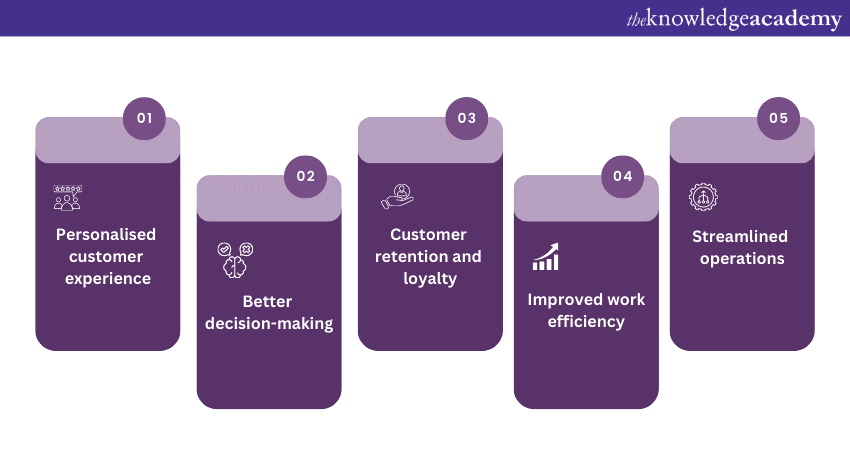We may not have the course you’re looking for. If you enquire or give us a call on 01344203999 and speak to our training experts, we may still be able to help with your training requirements.
Training Outcomes Within Your Budget!
We ensure quality, budget-alignment, and timely delivery by our expert instructors.

Data is the momentum that drives business success. It holds valuable insights that can propel a business to new heights. Data Analytics is designed to be a powerful tool that transforms raw data into actionable insights. From small start-ups to global corporations, it is becoming an indispensable tool in the business arsenal.
According to a 2022 Statista report, the international big Data Analytics market was valued at more than 186 billion GBP in 2021. The same report reveals that the Data Analytics domain is set to see massive growth over the years, crossing over 505 billion GBP in 2029. Explore this blog, where we explain the top five benefits of Data Analytics that will help you find career opportunities. To learn more, keep reading!
Table of Contents
1) A brief overview of Data Analytics
2) The importance of Data Analytics
3) Exploring the top 5 Benefits of Data Analytics
a) Personalised customer experience
b) Better decision making
c) Customer retention and loyalty
d) Improved work efficiency
e) Streamlined operations
4) Conclusion
A brief overview of Data Analytics
Data Analytics is a multidimensional discipline that involves the comprehensive examination, cleansing, transformation, and modelling of raw data. Its purpose is to distil vast quantities of information into actionable insights to aid decision-making processes. Rooted in the increasing digitisation of our world, Data Analytics is an integral part of various sectors, from business and healthcare to education and government.
Additionally, it helps organisations to better understand patterns and trends, streamline operations, manage risk, tailor customer experiences, and even drive innovation. By leveraging the power of Data Analytics, a business can acquire a competitive edge, make informed decisions, and anticipate future trends or challenges. Thus, it's an indispensable tool in our modern, data-driven society.

The importance of Data Analytics
Here are the key points highlighting the importance of Data Analytics, briefly as follows:
a) Informed decision-making: Data Analytics provides factual, evidence-based insights that guide strategic planning and decision-making, eliminating guesswork.
b) Operational efficiency: By identifying patterns, bottlenecks, and areas of inefficiency, Data Analytics helps organisations streamline their operations and improve productivity.
c) Risk management: Data Analytics is an essential tool in predicting potential threats and managing risks, thus enabling proactive response strategies.
d) Customer experience: Through the analysis of customer data, businesses can personalise their services, delivering a better, more tailored user experience.
e) Market trends: Data Analytics aids in the understanding of market trends and customer behaviour, equipping businesses to stay ahead of the curve.
f) Innovation: By providing unique insights, Data Analytics can spark new ideas, leading to the development of innovative products and services.
Exploring the top 5 Benefits of Data Analytics
Here is a list explaining What are the Benefits of Data Analytics in further detail, as follows:

1) Personalised customer experience
Personalised customer experience involves creating a unique, tailored interaction for each customer based on their individual needs, preferences, and behaviour. It's the process of making customers feel special and valued by delivering services or products that resonate with them personally. This level of personalisation is no longer a mere preference in today's hyper-competitive business landscape, but rather a necessity.
Data Analytics is at the heart of personalised customer experience. By examining diverse data points like customers' buying habits, browsing history, preferences, and feedback, businesses can gain deep insights into what customers truly want. This enables them to tailor their marketing strategies, product offerings, and customer service to match the needs and expectations of each customer.
The result is a customer experience that feels personal and relevant, leading to increased customer satisfaction, engagement, and loyalty. Customers who feel understood and valued are more likely to stay loyal to the brand, make repeat purchases, and even recommend the brand to others.
Enhance your knowledge to provide excellent customer experience, by signing up for the Enhance Customer Experience Masterclass Course now!
2) Better decision-making
Better decision-making is a key driver of business success and growth. It involves making choices that are informed, strategic, and based on accurate, timely information. In a world where businesses are flooded with data, it's Data Analytics that turns this information into valuable insights that guide decision-making processes.
Through Data Analytics, businesses can identify trends, patterns, and correlations in data that might otherwise go unnoticed. These insights allow for evidence-based decisions that align with business goals and market dynamics. Whether it's deciding on new product launches, determining marketing strategies, or optimising operational efficiency, Data Analytics provides the necessary information to make these decisions confidently and effectively.
Importantly, better decision-making through Data Analytics reduces the risk associated with decisions, as they are no longer based on assumptions or intuition but on hard data. This leads to better business outcomes, from improved customer satisfaction to increased profitability.
Acquire the basic knowledge of Data Analytics, by signing up for the Data Analytics for Marketing Professional Course now!
3) Customer retention and loyalty
Customer retention and loyalty are crucial pillars of business success. They refer to a company's ability to retain customers over a period and their continued patronage and loyalty towards the brand. The emphasis here is on building long-term relationships that extend beyond the first transaction to create an enduring bond between the customer and the business.
Data Analytics play an instrumental role in fostering customer retention and loyalty. By leveraging customer data, businesses can gain deep insights into customer behaviour, needs, preferences, and levels of satisfaction. These insights help them tailor their offerings and create personalised experiences, which are key drivers of customer loyalty.
Loyal customers provide a multitude of benefits to a business. First, they are more likely to make repeat purchases, contributing to a consistent revenue stream. Secondly, they often become brand advocates, spreading positive word-of-mouth and effectively acting as free marketing agents for the brand.
Learn the fundamentals of retaining your customers, by signing up for the Customer Retention Masterclass Course now!
4) Improved work efficiency
Improved work efficiency is a key factor in the success and growth of an organisation. It involves streamlining processes and maximising productivity while minimising waste and inefficiency. With increased efficiency, organisations can achieve better results, improve service delivery, and increase profitability, all without exhausting additional resources.
Data Analytics can greatly enhance work efficiency. By analysing workflow processes and performance metrics, it can pinpoint bottlenecks, areas of waste, or inefficiencies that hinder productivity. These insights can guide the implementation of strategies to optimise workflows, redistribute workload, or even automate repetitive tasks.
For example, if data analysis reveals that a significant amount of time is spent on manual data entry, businesses could consider implementing automation software to handle this task, freeing up employees to focus on more value-added activities.
5) Streamlined operations
Streamlined operations are a fundamental aspect of any successful business. It involves the systematic organisation and management of tasks and processes to ensure optimal performance, efficiency, and productivity. Streamlining leads to quicker turnaround times, reduced errors, and, ultimately, higher customer satisfaction.
In the context of Data Analytics, streamlined operations can be achieved by using data insights to identify inefficiencies, redundancies, or bottlenecks in your current operational processes. For instance, it can highlight areas where tasks are duplicated, time is wasted, or resources are underutilised.
Once these areas are identified, businesses can make targeted changes to improve their processes. This could involve adopting new technologies, redefining roles and responsibilities, or reorganising workflow. The result is a smoother, more efficient operation that not only saves time and resources but also improves the quality of products or services delivered.
Conclusion
The Benefits of Data Analytics are significant, ranging from personalised customer experiences to better decision-making, enhanced work efficiency, streamlined operations, and improved customer retention and loyalty. By leveraging these advantages, organisations can not only increase their competitiveness but also pave the way for sustainable growth. The power of Data Analytics lies in its ability to transform raw data into actionable insights, making it a game-changer in today's data-driven world.
Acquire in-depth knowledge of digital technologies for your organisation, by signing up for the Digital Marketing Courses now!
Frequently Asked Questions
Upcoming Data, Analytics & AI Resources Batches & Dates
Date
 Advanced Data Analytics Course
Advanced Data Analytics Course
Mon 12th Aug 2024
Mon 9th Dec 2024







 Top Rated Course
Top Rated Course


 If you wish to make any changes to your course, please
If you wish to make any changes to your course, please


